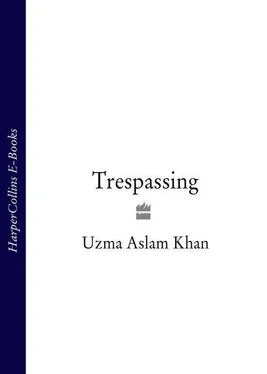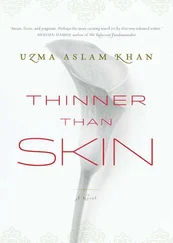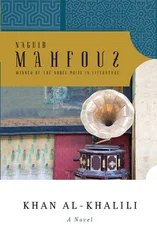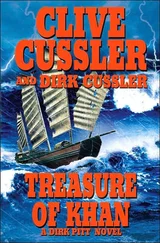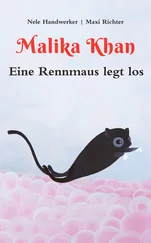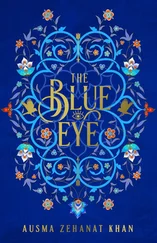‘That’s a bit extreme,’ Daanish mused. ‘What do they eat?’
‘Leaves. There’s a large mulberry tree in the empty plot at the end of the street. They’ll eat lettuce but they prefer the leaves of that tree, especially if chopped.’
The builders were pleased to take time off and chat with the boy from Amreeka. Though Daanish was pleased to get away from the mourners, he soon tired of being asked for a visa.
‘You should see how I’m treated at their Consulate! I’m nothing to them! I can’t help you!’
They hadn’t believed him.
Daanish turned away from the window and looked in one of the drawers where his shells had been. They were gone now. His temper began to rise. For the millionth time, he opened the door of the new closet and rummaged through the pile of clothes Anu had stacked. His beautiful shell boxes had been stored in the old closet. They too were gone. He slammed the door shut.
Anu was the only one who could have gone through his things. Yet she denied it. He shook his head: the doctor would never have invaded his privacy. It had to be her. Why? And it seemed she was still at it: his books and the envelope full of photographs were also gone. So was his bloody camera!
This was not how he remembered her. She’d changed. He did not want her to. She ought to be steady, like the boulder she sat on while he and his father went exploring. They’d been a piece, like a vase of cut glass, with her the light from the back and his father the glowing foreground. With the front gone, she was strangely like a gaping well. He was afraid of peering in too far.
She’d not even told him what ‘question’ she’d posed the morning of his arrival. ‘There is plenty of time to answer me,’ she’d said, but then the next evening, knew nothing about it. He cursed again.
Shedding his clothes, he stood before the full-length mirror. The light-brown eyes that answered back were his father’s. After hearing of their likeness for years, he saw it clearly now. He was exactly his height. The weight he’d acquired this year at college, when the plastic flavors of Fully Food finally stopped nauseating him, was beginning to settle around his midriff in a soft, barely noticeable belt of flesh, probably exactly as it had begun to do on the doctor when he was twenty-two. His legs were still sleek and sinewy. Swimmer’s legs. Going by the doctor, they’d always be Daanish’s best feature.
Becky had admired them the day they first met, when he walked her home from the gym. Thinking of her made him remember the missing photographs again. He’d liked the one of Pamela leaning against an oak tree. The ground was strewn with autumn leaves reminding him of their tryst in the sunken garden where Daanish loved to roam. Only, there was none of the humiliation of that time with Penny. By the time he’d met Pamela, Daanish knew better than to poke a stomach or buttock like a blind mole. The photograph was taken just before she sat on the bed of leaves and began to slowly undo her blouse. It was a three-quarter view, so her right bluish-green eye appeared larger than the left. Above it, a thin eyebrow was raised, giving Pamela her characteristic expression: Oh yeah?
Damn! Where was it? For the next half-hour, he searched every corner of the rearranged, freshly painted room. His eye fell on the lacquer box, one of the few items not missing from the duffel bag. But this too had been touched. He’d never before seen the photograph inside it. What on earth was it doing there?
His head began to throb. He got into the shower. Because there’d been no electricity since yesterday, the water pump hadn’t been switched on. The tank was almost dry and the pressure so low only two holes of the showerhead released a few drops. Still soapy, Daanish returned to his room and stood naked on the new white rug. He looked up at the ceiling fan wishing for the telltale whine that sounded when it spun. But the loadshedding continued.
Soon his sweat blended with the soap and he was covered in a thin coat of slime. He left a trail of gray footprints on the rug. This pleased him. As the rug’s color muddied, his head began to clear. Toweling himself dry, he listened to Anu making preparations for the Quran Khwani downstairs. It was just after eight. The mourners would start arriving around nine. There were fewer now that three weeks had passed since his father’s death but there were still more than he wanted to meet. He combed his hair and braced himself for another day of being the Amreekan orphan.
But he didn’t go downstairs. Instead, he returned to the drawer. He kept the three cocoons there now. Exactly as the driver said, the insects had spun their homes. Though he was disappointed to have missed the weaving process, the downy balls entertained him in their own way. They moved. First he’d left them on a pile of newspapers on his desk. When he returned, they’d jumped into a walnut bowl that held his pens. By the following day, they’d hopped onto the desk, far away from the newspaper. No matter where he put them, they wanted to be somewhere else. At last he found a place they found acceptable: inside a dark, dry corner of the drawer. According to the driver, if Daanish wanted the threads he’d have to cook them next week.
Kneeling for a closer look, he whispered, cocoon. It had a calming sound. Soft like sleep, like nestling. He fit into it somehow. ‘What should I do with you?’ he asked. ‘You’re so different from my beautiful shells. They can’t live without water, you can’t live within it.’
He thought of the gazelle-eyed girl in the blue dupatta. If she returned, he wanted to be the first to talk to her. He wanted to tell her he’d followed her advice and found out what she’d left. He wanted also to look more closely at that smooth, caramel face with the gracefully tapering chin. But he’d not seen her again. Did he even remember her correctly? Hell, he needed a picture of her too.
It was the hope of finding the girl that finally forced Daanish downstairs.
A swift glance revealed the girl was not there. He kissed his mother good morning and picked up a siparah, heading for the adjoining room, where the men sat.
The room looked on to a small garden fringed with hibiscus bushes. The grass was beginning to scorch in patches. His street badly wanted water. Two lanes away lived a minister, so no loadshedding ever plagued that street. Some of the mourners were discussing this when he joined them. They fanned themselves with newspapers and Daanish knew that in amongst the prayers for his dead father were prayers for bijly, and a brand new lot of politicians.
Along the opposite wall sat three of Daanish’s uncles. They came and sat beside him, too hot to read, keener on conversation. His chacha turned to him. ‘All his life Shafqat Bhai knew you would make him proud. Everything he did, every hour of toil, was for you.’
Another uncle chipped in, ‘Our children in Amreeka do very well. There, of course, they have all the opportunity to shine. And they do! Look at Daanishwar!’ He thumped Daanish heartily on the back. ‘Come, you’ve told us nothing of your experiences there. All good things must be shared.’
The other men nodded with gusto.
When Daanish remained noncommittal, an older cousin nudged him. ‘I hear it’s very quiet and peaceful over there. Not like here, with army troops muscling their way into our neighborhoods.’
Immediately his phoopa interrupted, ‘Things are a lot better since the army operation. I know. I drive through Nazimabad every day, unlike you in your elite street. I see how many fewer buses and trucks are being burned. It’s because of the troops!’
‘Yes,’ said his chacha. ‘But we have to question their tactics. They’re rounding up anyone from the Muhajir areas and beating them regardless. This is only going to fuel the MQM’s anger.’
Читать дальше
Конец ознакомительного отрывка
Купить книгу
